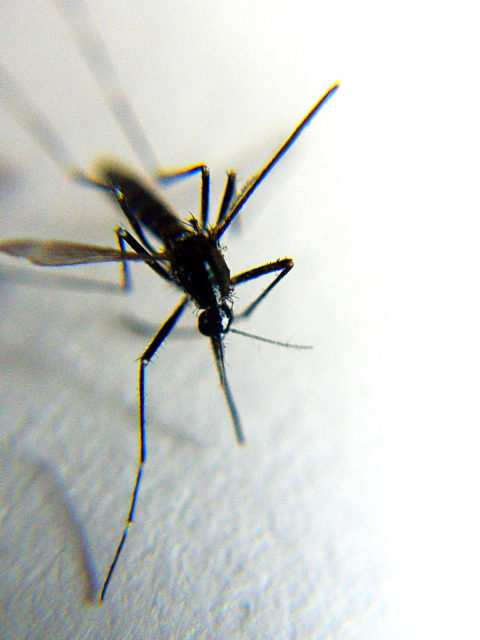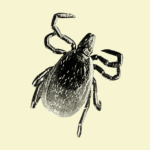Outbreak of 2012
According to the Center for Disease Control (CDC) as of August 21st, nearly 1118 people have become ill from the West Nile Virus this summer; 41 have died from the most severe form of this illness. This is biggest outbreak since 2004. Since the virus is transmitted by mosquito bites, the high incidence of the disease is attributed to an unusually large number of mosquitoes. More mosquitoes than usual survived over the winter due to the unseasonably mild weather. To make matters worse, this summer’s hot weather has speeded up the mosquito’s reproductive cycle.
Five states have been particularly hard hit; 75% of the cases occurred in Texas, Mississippi, Louisiana, South Dakota, and Oklahoma. Poor Texas has borne the brunt of the outbreak with nearly half of all cases occurring within its borders. However if you live outside of these states, you’re not out of the woods. As of August 21, 2012, cases have been reported from 47 states. This made me wonder if there have been cases where I live in central Ohio.
To learn the geographical spread of West Nile Virus, I was surprised that the CDC directed me to the website for the U.S. Geological Survey (USGS). Apparently there is some lag between reports of cases to the CDC and mapping of the illness by the USGS. As of August 22nd, the data which has been mapped only covered cases reported as of August 14th (693 cases). Transmission of the virus peaks from the beginning of July through mid-September.
Check out the maps
To see the distribution of West Nile Disease for any county in the United States, go the U.S. map of human West Nile Virus disease at the USGS. Once you get there you can click on your state (or U.S. territory) to get local details.
To see the distribution of West Nile Disease in Ohio, go directly to the Ohio map of human West Nile Virus disease. Again be aware that there is a lag between the time that cases are reported to the CDC and the time when they are added to the map. I just heard on the radio yesterday that a case was reported in Columbus, but the map hasn’t included this case yet.
Besides reporting human cases of disease caused by the West Nile Virus, the U.S. government also sponsors a program where mosquitoes are trapped and tested to see if they are carrying the virus. So it’s possible that you live in a state where lots of mosquitoes are carrying the disease, but the people there have been lucky so far in not contracting the illness. To see the distribution of disease-carrying mosquitoes for the entire country, check out this U.S. map of mosquitoes carrying West Nile Virus. Or for Ohio, you can go directly to the Ohio map of mosquitoes carrying West Nile Virus.
When I went from the U.S. map showing human cases to the one showing mosquito carriers, I was surprised to see our neighboring state of Indiana suddenly light up like a Christmas tree. ![]() It seems that the people of Indiana have been very lucky.
It seems that the people of Indiana have been very lucky.
The Good News
The good news is that if you are infected by a mosquito carrying West Nile Virus, you have an 80% chance of not having any symptoms whatsoever. In fact, you may have been infected years ago and never even knew it.
The Disease
Of the unlucky 20% who will go on to develop West Nile Fever, here’s what you can expect:
- Fever
- Swollen lymph glands
- Headache
- Body aches
- Fatigue
Some people will also have a rash show up on the trunk of their body, but this symptom is “optional”. If the disease is going to develop, its symptoms appear 3 to 14 days after being bit by a mosquito carrying the virus. People who develop West Nile Fever may be sick anywhere from several days to several weeks with a single week perhaps being the most common duration. This form of the illness made up 44% of the cases reported to the CDC as of August 21, 2012.
There is a less than 1% chance that the infection will cause an inflammation within the individual’s Central Nervous System. Those over 50 (that’s me!), or those whose immune system has been compromised are more likely to develop this severe form of the illness. When this happens the infection becomes a neuroinvasive disease. The rest of the cases reported to the CDC (56%) were instances of this very serious form of the disease. Depending on which part of the Central Nervous System becomes inflamed, the disease gets a somewhat different label as described below.
- encephalitis: Inflammation of the brain
- meningitis: Inflammation of the membrane that surrounds the brain and spinal cord
- meningoencephalitis: Inflammation of both the brain and the surrounding membrane
- poliomyelitis: Inflammation of the spinal cord
Reducing Your Risk
When hiking or camping
DEET is your friend! I like to use OFF! Deep Wood (dry). It’s 25% DEET (N, N-diethyl-m-toluamide), and it comes in a 2.5 oz can that easily fits into my fanny pack. I put it inside a Ziploc bag just in case something else in my pack might squeeze into the button. I like the fact that it’s not greasy or oily. Besides spraying it on exposed skin, you can also spray it on the outside of your clothing (it won’t damage cotton, wool or nylon). Mosquitoes can bite right through thin clothing like tee-shirts. And since they aren’t landing directly on your skin, you are less likely to notice that you’re being bit. So spray the outside of those tee-shirts. If you are wearing shorts with loose-fitting legs, lift them up and spray the skin of your legs under the shorts. During the summer I typically wear a wide-brimmed tilley hat. I spray the underside of the rim to help keep insects away from my face and neck. Don’t spray DEET directly into your face. Instead spray it on your hand and rub your hand on your face being careful not to get it near your eyes, nostrils or mouth. Do not spray it on injured skin (so avoid spraying skin that has been scraped, cut, burned, even sunburned). If you have kids, you should be the one who applies DEET to their skin and clothing because you can do it more safely.
As much fun as it is to sit around the campfire after dark when you’re camping, considering the high incidence of West Nile Virus this summer, you might want to consider getting into your tent or camper early. You are most likely to be bit from dusk to dawn, so taking shelter in a mosquito-free zone then makes good sense.
If your tent has holes or tears, patch them! Bring a patching kit with you in case one develops while you are at your campsite.
Surprisingly I’ve seen a number of sources saying that mosquitoes are more likely to bite you if you’re wearing dark clothes, so it’s best to wear light-colored clothing. I’ve also seen sources claim that you are more likely to be bit if you use perfumes, colognes, scented lotions, and/or scented shampoos.
Health officials are always recommending that people avoid bites by wearing long sleeves and pants when outside, so I’ll pass that info along. However in the heat of summer, I don’t want to get heat exhaustion, either. Given how hot it has been, the only way I could stand wearing long sleeves and pants in the afternoon would be if they were made of very thin material, but then mosquitoes could bite right through them. If I have to be out after dark, I think it could be cool enough then to make long pants and sleeves practical.
Ultrasonic devices that are supposed to drive insects away don’t work! Neither do vitamin B lotions.
Around the home
If you keep the air circulating in your home via screen doors and screened windows, makes sure there are no holes or rips in the screens. Eliminate sources of standing water around your home, including open containers where rain water could collect. Water can also pool in clogged gutters or downspouts. If you have containers outside that are supposed to contain water, such as kiddie pools, pet water bowls, birdbaths, etc., you should make sure that you replace the water every two to three days. Some people buy water wigglers for their birdbaths, or place a jug of dripping water above their bird bath to keep the water surface agitated so it is not suitable for mosquito larvae. Long grass is also supposed to be a hazard, so keep those lawns mowed.
Horse Health
Horses, like people, can contract the severe form of West Virus Nile disease; it can even kill them. If you have horses I recommend that you read the section of the FAQ About West Nile Virus and Mosquito Management that deals with horses (published by the Colorado State University).
Additional information
- West Nile Virus, published by the NYC Dept. of Heath and Mental Hygiene
- West Nile Virus — Fight the Bite!, published by the CDC.
- West Nile Virus Is A Risk You Can Do Something About With A Few Simple Steps, published by the CDC.
- Symptoms of West Nile Virus, published by the CDC
- Risk factors for West Nile Virus, published by the Mayo Clinic.
- The Insect Repellent DEET, published by the EPA
More on Health & Safety





We got the mosquitos carrying West Nile later this summer in Alberta. just a few people had it. but the health authorities put the warnings out.I hate bug spray but after having a patient with West Nile a few years ago, I take precautions. He contacted it in Toronto and it affected his muscles and speech afterward, very debilitating.
I am so glad that it has become cool enough to wear long pants out. I’m hoping that will keep the mosquitoes from biting me without having to go to the bother of using DEET. And to be honest, I’m rooting for a hard frost to kill the little blood-suckers off. What with the huge number of people who’ve contract West Nile virus, I think we could all use a break.
On the more pleasant side, one of my favorite Canadian birds may be spending the winter in my yard. I saw two red-breasted nuthatches making heavy use of my bird feeder today. I do hope they choose to stay around here. They’re so cute.
I had a real thrill with them once when I was feeding chickadees out of my hand on a city trail and had a red-breasted nuthatch also land in my hand! They are so light. hope they stay with you this season.
Wow! I’ve never had a wild bird land on my hand. And to think you had one of my favorites perched there!
So far I’ve seen up to three red-breasted nuthatches at my feeders at the same time. I’m trying to stack things in favor of their staying by putting all their favorite foods out.
Very helpful! Thank you Deb!
Your welcome, Sharon. Thanks for stopping by. 🙂
Thanks a lot for the info.
No problem, marviiilous. 🙂
Thanks for all of this Deb. I keep hearing about it on the news, so I looked up California on the map link in your piece of writing. I don’t spend a lot of time outdoors, but I know you do…so be careful out there!
Thanks for your word of caution. Despite using DEET yesterday, a mosquito snuck under my sleeve and got me. Well now I know to pull my sleeve up and spray there, too.
Well now I know to pull my sleeve up and spray there, too.